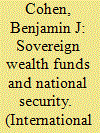| Srl | Item |
| 1 |
ID:
096246


|
|
|
|
|
| Publication |
2010.
|
| Summary/Abstract |
If the G's are the world's steering committee, the step from G7 to G20 deepened the democratic legitimacy of this committee. However, it also shifted influence to a group that share little else other than economic power: they have diverse experiences, challenges, cultural perspectives and starting points. This is particularly the case in the field of financial regulation, where action across these countries in recent months-despite all the language of global regulation-is increasingly local. The prospect of the new global being quite local has dismayed some. But it need not. This article challenges the dichotomy of more global versus more local. It argues that financial internationalism-greater cooperation by nations for the benefit of all-is better served by institutions that help to integrate diverse systems than those which try to enforce one-size-fits-all approach to very different economies.
International banks persuaded regulators of the benefits of home country regulation and a level playing field for bankers. But the benefits accrued largely to the banks in the boom and proved an avenue for contagion during the crash. Host country regulation may prove a safer way to regulate financial systems, in particular by allowing regulation to be more responsive to national economic conditions and cycles. It is likely that a shift back to host country regulation will act as a drag on international capital flows. The instinct of economists is that the cost of this is uncertain, suspect and conditional, especially when compared to the costs of financial crashes. Host country regulation does not mean there is no role for international institutions, such as the newly minted Financial Stability Board. Instead, it suggests a more nuanced role, potentially encompassing the policing of international market infrastructure, financial protectionism, information free flow between regulators and the convergence of regulatory principles and the consolidation of regulatory instruments. An informed and collegiate process of integrating different financial systems will be a more resilient system than one which tries to apply a single rule book across inherently different countries.
|
|
|
|
|
|
|
|
|
|
|
|
|
|
|
|
| 2 |
ID:
091628


|
|
|
|
|
| Publication |
2009.
|
| Summary/Abstract |
One of the most striking financial developments in recent years is the emergence of sovereign wealth funds (SWFs)-large publicly owned investment portfolios, which are growing rapidly in both number and size. In a global environment already roiled by a prolonged credit crisis, SWFs raise tricky and potentially controversial new questions for international financial regulation. One issue of concern to many in host countries is the possibility that some SWFs might be used for overt or tacit political purposes, posing a challenge for global monetary governance: a Great Tradeoff between the world community's collective interest in sustaining the openness of capital markets and the legitimate national security concerns of individual host countries. Can some balance between the two be found that will be both stable and acceptable to all concerned? Individually as well as collectively, recipient countries have begun to address the regulatory challenge directly. To date, however, accomplishments have been slight and have failed to stem a noticeable drift towards financial protectionism. A review of some recent proposals suggests that there is no foolproof solution to the Great Tradeoff. But the potential for controversy could be significantly reduced by a negotiated agreement among host governments addressing three key issues: definitions, risk assessment and dispute resolution. The most logical venue for such an exercise would be the OECD, building on its already extensive experience with international investment issues.
|
|
|
|
|
|
|
|
|
|
|
|
|
|
|
|